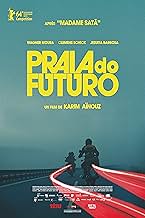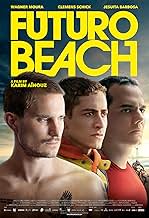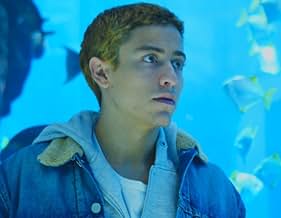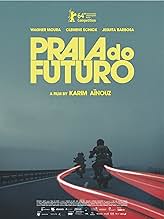AVALIAÇÃO DA IMDb
6,3/10
3,5 mil
SUA AVALIAÇÃO
Pouco depois de não conseguir resgatar um homem afogado, Donato conhece Konrad, um amigo da vítima. Eles logo começam um relacionamento que parece condenado desde o início, enquanto o passad... Ler tudoPouco depois de não conseguir resgatar um homem afogado, Donato conhece Konrad, um amigo da vítima. Eles logo começam um relacionamento que parece condenado desde o início, enquanto o passado de Donato o alcança.Pouco depois de não conseguir resgatar um homem afogado, Donato conhece Konrad, um amigo da vítima. Eles logo começam um relacionamento que parece condenado desde o início, enquanto o passado de Donato o alcança.
- Direção
- Roteiristas
- Artistas
- Prêmios
- 11 vitórias e 20 indicações no total
Demick Lopes
- Capitão Motta
- (as Démick Lopes)
Yannik Burwiek
- Filho de Heiko
- (as Yannik Burwieck)
Jesuíta Barbosa
- Ayrton - 18 anos
- (as Jesuita Barbosa)
- Direção
- Roteiristas
- Elenco e equipe completos
- Produção, bilheteria e muito mais no IMDbPro
Avaliações em destaque
Rather introspective, this Brazilian/German film, with little plot and a lot of propositions easy to follow, but maybe not that easy to understand. The story centers on a safeguard attracted to a man he saves. They soon go for sex, softly depicted in the movie. Next they go to Germany, in a process of inner evolution for the Brazilian lead that may be difficult for the appetite of American audiences, little is spoken. A Brazilian like me does understand it better, for it's a dilemma most common for a man divided between its original family and a life he thinks ought to be better. The principals are the continuum of the film, both handsome, specially the well-built safeguard. It was already discussed that the word 'love' is not part of the plot. Not a single time it is mentioned they could experiment this sentiment to one another, and one will really have to speculate on which were the inner movements that made the Brazilian immigrate. Not an easy film, but I think it worth the effort. A trivia: in Brazil, where Wagner Moura is well known and the film went to commercial circuit, the sex scenes were a scandal. So much so that audiences where advertised in the tickets about the subject.
beautiful, bitter, useful. a film about relations and choices. delicate poetry and good performances. not comfortable but touching for its honesty, for the landscapes, for the dialogs and for the grace of silence. a film about love and its decision, about guilt feelings and about gestures who are only exercise to know happiness. about the responsibility. and about the past who remains the skin of present. short- a beautiful film. not in ordinary manner but that detail defines it. because it is the work of an admirable director who use the right nuances for a story who might be almost cruel. a gentle speech about the sense of life.
An award-winning screenwriter once told me the secret to his success. It's knowing and never forgetting the essence of film (and this holds true for directors, actors, cinematographers, make-up artists, and production designers as well).
Simply put, "A movie is a story that's told with pictures. Pictures that move." Every line, every shot, every scene, every setting, every prop, should be informed by this.
Few films exemplify this as well as Karim Aïnouz' "Praia do Futuro." Ainouz has said, "For me film is time, space, and sound distilled in a moving image."
It's also, you can see clearly from this film, about bodies moving in time and space and within architecture.
(There's one memorable scene of muscular lifeguards training on the beach and then running into the sea that's right out of poet Walt Whitman's "I Sing the Body Electric.")
Every shot, every scene in this spare, visual style of storytelling is a work of art, which shouldn't be surprising as Ainouz came to film making in a roundabout way, leaving Fortaleza, Brazil (where the opening of "Praia do Futuro" is set) to study architecture in Brazil's futuristic capital, Brasilia. He then studied fine art in New York, took up painting and photography, only to finally study film in graduate school at NYU. He sees himself primarily as a visual artist.
This is a film about fear and courage, about risking it all. It's also about displacement and freedom. But, unlike Hollywood films, it never spells anything out. These ideas are dealt with elliptically and obliquely and usually through movement and visuals rather than through dialogue. The protagonists move through water and dance and speed-race motorcycles through breathtaking scenery and they make passionate, sensual love.
If you like things spelled out for you and wrapped up with a bow this is not the film for you. Much of what happens, happens off-screen. Characters don't talk about their feelings or reveal much through dialogue and the ending is cryptic. But pay attention: It's the visuals and motion and actions that reveal everything.
And about that ending--there is some actual "telling" rather than showing in the end (don't worry, it's not a spoiler) and it's so emblematic of the film I'll cite it here. As we see two motorcycles disappear into the gray mist on a twisting, turning German autobahn, Donato, in a voice-over, addresses his brother, the one he'd abandoned eight years earlier when he left Brazil for Germany.
"There are two types of fear and courage, Speed. I act as if there is no danger. But you know that everything is dangerous in this endless sea."
"Praia do Futuro" invites you to take a swim, take a risk, try your luck. It doesn't promise a happy ending, but it doesn't preclude one, either.
Simply put, "A movie is a story that's told with pictures. Pictures that move." Every line, every shot, every scene, every setting, every prop, should be informed by this.
Few films exemplify this as well as Karim Aïnouz' "Praia do Futuro." Ainouz has said, "For me film is time, space, and sound distilled in a moving image."
It's also, you can see clearly from this film, about bodies moving in time and space and within architecture.
(There's one memorable scene of muscular lifeguards training on the beach and then running into the sea that's right out of poet Walt Whitman's "I Sing the Body Electric.")
Every shot, every scene in this spare, visual style of storytelling is a work of art, which shouldn't be surprising as Ainouz came to film making in a roundabout way, leaving Fortaleza, Brazil (where the opening of "Praia do Futuro" is set) to study architecture in Brazil's futuristic capital, Brasilia. He then studied fine art in New York, took up painting and photography, only to finally study film in graduate school at NYU. He sees himself primarily as a visual artist.
This is a film about fear and courage, about risking it all. It's also about displacement and freedom. But, unlike Hollywood films, it never spells anything out. These ideas are dealt with elliptically and obliquely and usually through movement and visuals rather than through dialogue. The protagonists move through water and dance and speed-race motorcycles through breathtaking scenery and they make passionate, sensual love.
If you like things spelled out for you and wrapped up with a bow this is not the film for you. Much of what happens, happens off-screen. Characters don't talk about their feelings or reveal much through dialogue and the ending is cryptic. But pay attention: It's the visuals and motion and actions that reveal everything.
And about that ending--there is some actual "telling" rather than showing in the end (don't worry, it's not a spoiler) and it's so emblematic of the film I'll cite it here. As we see two motorcycles disappear into the gray mist on a twisting, turning German autobahn, Donato, in a voice-over, addresses his brother, the one he'd abandoned eight years earlier when he left Brazil for Germany.
"There are two types of fear and courage, Speed. I act as if there is no danger. But you know that everything is dangerous in this endless sea."
"Praia do Futuro" invites you to take a swim, take a risk, try your luck. It doesn't promise a happy ending, but it doesn't preclude one, either.
This is one of those films that- when you read the story synopsis- sounds like it will be utter sentimental tripe, lousy with cliché-ridden dialog.
This film is anything but.
This is one of the best gay male-themed films I've seen in a long time. I'd put it right up there with Weekend in quality, but the two films couldn't be more different. Weekend is dialog-driven, Futuro Beach is not. There are long spans where nobody says much of anything; you just observe.
In the beginning, the story doesn't seem like it of holds a lot of promise.
But just wait. When this film shifts gears, it really shifts gears. It's impossible to predict where it's going next, always a sure sign of a good movie, IMO.
While the dialog is sparse and unsentimental, there is emotion all around. The men may be terse with each other, but they're expressive. We don't know if they're in love. That's how unsentimental this movie is. The words "I love you" are never going to be spoken in this modern relationship. What we do know is that there is a dynamic between them that neither wants to abandon.
The themes of this movie are big: life (truly living) and death (just existing). So you might be tempted to assign life-message metaphors to the locale and action. Don't. Just let the film wash over you. This is one of those rare movies that immerses you in its own universe, and by doing so, gives you some insight into your own.
This film is anything but.
This is one of the best gay male-themed films I've seen in a long time. I'd put it right up there with Weekend in quality, but the two films couldn't be more different. Weekend is dialog-driven, Futuro Beach is not. There are long spans where nobody says much of anything; you just observe.
In the beginning, the story doesn't seem like it of holds a lot of promise.
But just wait. When this film shifts gears, it really shifts gears. It's impossible to predict where it's going next, always a sure sign of a good movie, IMO.
While the dialog is sparse and unsentimental, there is emotion all around. The men may be terse with each other, but they're expressive. We don't know if they're in love. That's how unsentimental this movie is. The words "I love you" are never going to be spoken in this modern relationship. What we do know is that there is a dynamic between them that neither wants to abandon.
The themes of this movie are big: life (truly living) and death (just existing). So you might be tempted to assign life-message metaphors to the locale and action. Don't. Just let the film wash over you. This is one of those rare movies that immerses you in its own universe, and by doing so, gives you some insight into your own.
As beautiful a cinematic essay on the subject of fear as I've seen in a while, Karim Aïnouz's "Futuro Beach" manages to cover a plethora of fears common to the human condition - fear of solitude, fear of commitment, fear of rejection, fear of change, fear of death (hell, even fear of water is covered) – and the remarkable human ability to overcome them.
Donato (Wagner Moura) is a lifeguard at a Brazilian Beach who is only able to save one of two German tourists from drowning. Having never had to face death before, he reaches out to the surviving tourist Konrad (Clemens Schick) and soon finds himself in a complex relationship that leads him to question who he is and what he wants from life. Faced with making difficult choices, including the decision to abandon his younger brother and mother and relocate to Germany to join Konrad, Donato finds that his fears have followed him. Eventually isolating himself from Konrad and still unable to deal, he finds himself living a solitary life until he comes face-to-face with his past. Only then can he finally begin the journey of self-acceptance necessary to move beyond the fears that have held him back from experiencing a full life.
Cinematographer Ali Olay Gözkaya's stunning photography captures the natural beauty of the Brazilian and European locations and enhances the story's mood and tone. Performances are strong from the two principals and the two actors playing the younger brother Ayrton, ages 10 and 18 (Sávio Ygor Ramos and Jesuíta Barbosa,) also acquit themselves nicely. The scenes with the two brothers ably capture the special bond often shared between male siblings.
Often jumping from moments of quiet and solitude to scenes with pulsating sounds and action, "Futuro Beach" grabs you from its opening shots of motorcyclists dwarfed by the turbines of a wind farm to its concluding POV imagery of another motorcycle trek down an endless road at dusk. It excels at cinematically and dramatically capturing a snapshot of the often emotionally treacherous voyage that is life.
Donato (Wagner Moura) is a lifeguard at a Brazilian Beach who is only able to save one of two German tourists from drowning. Having never had to face death before, he reaches out to the surviving tourist Konrad (Clemens Schick) and soon finds himself in a complex relationship that leads him to question who he is and what he wants from life. Faced with making difficult choices, including the decision to abandon his younger brother and mother and relocate to Germany to join Konrad, Donato finds that his fears have followed him. Eventually isolating himself from Konrad and still unable to deal, he finds himself living a solitary life until he comes face-to-face with his past. Only then can he finally begin the journey of self-acceptance necessary to move beyond the fears that have held him back from experiencing a full life.
Cinematographer Ali Olay Gözkaya's stunning photography captures the natural beauty of the Brazilian and European locations and enhances the story's mood and tone. Performances are strong from the two principals and the two actors playing the younger brother Ayrton, ages 10 and 18 (Sávio Ygor Ramos and Jesuíta Barbosa,) also acquit themselves nicely. The scenes with the two brothers ably capture the special bond often shared between male siblings.
Often jumping from moments of quiet and solitude to scenes with pulsating sounds and action, "Futuro Beach" grabs you from its opening shots of motorcyclists dwarfed by the turbines of a wind farm to its concluding POV imagery of another motorcycle trek down an endless road at dusk. It excels at cinematically and dramatically capturing a snapshot of the often emotionally treacherous voyage that is life.
Você sabia?
- CuriosidadesAccording to Clemens Schick, he and Wagner Moura did not get along when they first met, but became close friends after filming their scenes.
- Erros de gravaçãoWhen Konrad drives around on a KTM in Germany, the motor noise you hear is clearly from a 4-in-a-row cylinders engine. But KTM only manufactures 1 and 2 cylinders motors that would never sound like this.
- Versões alternativasThe first love scene in the film's Part II section (containing footage of oral sex being performed) was cut in the theatrical/home video release.
- Trilhas sonorasHeroes
Written by David Bowie and Brian Eno
Principais escolhas
Faça login para avaliar e ver a lista de recomendações personalizadas
- How long is Futuro Beach?Fornecido pela Alexa
Detalhes
- Data de lançamento
- Países de origem
- Centrais de atendimento oficiais
- Idiomas
- Também conhecido como
- Futuro Beach
- Locações de filme
- Empresas de produção
- Consulte mais créditos da empresa na IMDbPro
Bilheteria
- Orçamento
- US$ 4.000.000 (estimativa)
- Faturamento bruto nos EUA e Canadá
- US$ 20.262
- Fim de semana de estreia nos EUA e Canadá
- US$ 3.324
- 1 de mar. de 2015
- Faturamento bruto mundial
- US$ 779.835
- Tempo de duração1 hora 46 minutos
- Cor
- Proporção
- 2.35 : 1
Contribua para esta página
Sugerir uma alteração ou adicionar conteúdo ausente

Principal brecha
By what name was Praia do Futuro (2014) officially released in Canada in English?
Responda
























